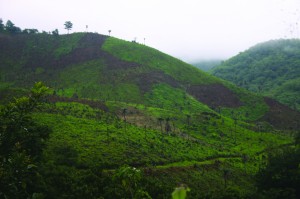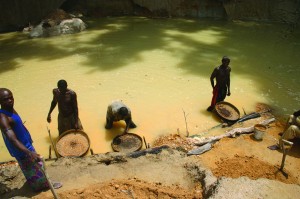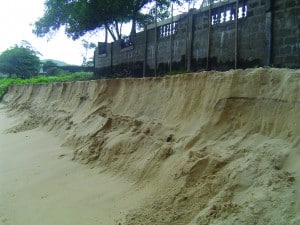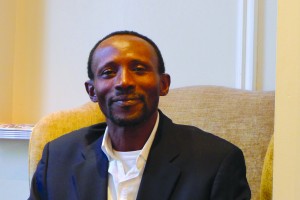By Frank Armstrong.
In Sierra Leone an amusing assortment of greetings has evolved to replace ‘pressing of the flesh’ that could give rise to Ebola contagion. From elbow jabs to clasped-hand bows, a gallows humour has derived.
The reality of Ebola is hidden from visitors: the main reminder the hand-held, infra-red thermometers that assail passers-by at checkpoints that have been set up at regular intervals along most highways. Statements such as “Ebola Stops With Me” are also emblazoned along roadsides, and posters showing symptoms are widely dispersed.
After an estimated 10,000 cases, the steady flow has reduced to a trickle and the country is ready to move on. But stoical Sierra Leoneans are accustomed to other epidemics such as AIDS and ubiquitous malaria, and endured a frightening decade-long civil war (1991-2002) that witnessed limb-severing among other horrific punishments.
Inhabiting temperate north-west Europe it is hard to grasp the challenge of this region’s climate. Throughout the year daytimes are stiflingly hot, rarely dipping below 30 degrees while during the wet season the force and duration of rain is such that at times one marvels at how much moisture the clouds contain.
The territory of Sierra Leone, like the rest of Africa, was framed by European colonisers without regard to its tribal constituents. But well before the ‘Scramble for Africa’ those societies had been destabilised by the arrival of European weapons and extensive raiding for the horrific trans-Atlantic slave trade. Freetown, the capital of Sierra Leone, like Monrovia in neighbouring Liberia, was established by the British as a colony for freed slaves and the national lingua franca Kreo comes from those first settlers. Sierra Leone became a British protectorate in 1896.
Today the human indicators in Sierra Leone are among the worst in Africa. Up to 40% of the population’s growth has been stunted due to poor nutrition in the womb and infancy. Rates of literacy are low. Above all it is poverty that makes the task of containing Ebola difficult.

Throughout the country electricity is intermittent and internet available only to aprivileged few, albeit many of the poorest seem to carry mobile phones. There are some decent roads but heavy rains make light work of others. The undulating surfaces are ruinous to vehicles; any driver must be a mechanic.
Commerce is everywhere in Sierra Leone, at any road stop a line of individuals, mostly women and children, greet vehicles usually with luscious fruits and vegetables. In Freetown and other cities market stalls and small shops line every artery. Money changes hands constantly, transactions are negotiated at every turn. As the state provides little or nothing, individuals must carve out niches to survive.
Donor countries and NGOs, including Ireland Aid, are assisting development. It is said that the Chinese are building a new airport outside Freetown and a road through the north of the country to Liberia. Some of this aid may be driven by commercial interest, but its continued flow is crucial to raising human wellbeing.
But, unfortunately, environmental considerations rarely register in the face of human intransigence. In time this may prove a grave mistake as Sierra Leone is reckoned to be the third most vulnerable country in the world to climate change.

Only a tiny proportion of Sierra Leone’s once abundant forests – part of the wider Upper Guinea belt – survives. Local wisdom has it that a meal is not complete without rice, which originated in Asia but whose impact is apparent here in the expanses of charred tree stumps everywhere. This slash and burn agriculture requires a twenty-year fallow period. Indeed a shift in dietary preferences towards other carbohydrate staples such as native cassava, plantains and yams that do not exert such a toll would be of great benefit, and would improve nutrition. The country’s future food security might depend on this as more land is degraded by demographic pressures. At least the presence of pests such as the tsetse fly deters large-scale ranching, though the goat, the main domesticated ruminant in Sierra Leone, often adversely affects recovering forests.
The multinational timber trade is also a leading cause of deforestation. Moreover, scaffolding for building works mainly comes in the form of bamboo derived from vulnerable forests. A simple measure would at least require development agencies to import steel scaffolding for their construction projects.
Then there is mining, including of fabled ‘Blood Diamonds’, competition for whose extraction was an underlying cause of the Sierra Leonean civil war. Both rebels and government troops collaborated in their extraction and the associated deforestation. Today as well as artisanal operations, bigger players including Western companies have moved to extract iron-ore, bauxite and diamonds.
The consequences of centuries of exploitation are everywhere apparent. With hillsides denuded of forest cover, top soil turns to suffocating dust in the dry season which is drained away when the rains arrive. The sea around Freetown acquires a brownish hue that stretches for miles. Millennia of accumulated humus cannot easily be regained.

The economic value of biodiversity, or natural capital, is increasingly recognised, especially as manifest in clean water, food and climate. But only more slowly are we recognising its value as a good in and of itself. Unfortunately most Sierra Leoneans are too impoverished to be able to see beyond immediate material considerations but there is a growing appreciation of nature in a region which exhibits extraordinary diversity.
A trip to Tiawa island, along the River Moa, brought to mind Joseph Conrad’s description of a similar profusion of life along another African river: “Going up that river was like travelling back to the earliest beginnings of the world, when vegetation rioted on the earth and the big trees were kings. An empty stream, a great silence, an impenetrable forest”.
Maintaining the integrity of the biodiversity on the island depends on a delicate balancing that has required extensive consultation with local villages. An EU project has brought solar power to many nearby. In turn, village elders deter their tribesmen from hunting for the array of primates that populate the site. So-called bush meat is not highly prized by the local communities but poverty and ignorance impels some to seek it out.
Stopping hunting is not merely a sentimental concern. Diseases such as Ebola and Aids are zoonotic; that is they spread from one species to another, often through the consumption of flesh. A species of fruit bat has been identified as a potential reservoir host for Ebola while diseased monkey were responsible for AIDS. Curbing the consumption of bush meat is an important component in ending further zoonotic outbreaks.
The challenges involved with instigating projects are considerable here. Even purchasing property is tricky as the state’s registry may issue more than one deed for the same land. Corruption and nepotism are endemic. This gives rise to a certain despondency as even the highly educated and energetic find advancement difficult. Career frustrations make the option of leaving the country appealing.
Almost anything is available at the right price. Dramatic luxury co-exists with withering poverty. On the roads, the latest US car models mingle with men dragging large wheelbarrows and women with heavy loads on their heads. With both actual and comparative poverty, it is hardly surprising that individuals should aspire to great wealth should circumstances permit. Inculcating a common interest between people is a serious challenge, and an understanding of the limitations of their natural environment is crucial.
Hope lies with the increased literacy of children, improved education and access to information. A gap in the onslaught of disease and conflict can spur the next generation to re-build the country based on principles of fairness and sustainability.

Tommy Garnett is a dual citizen of Ireland and Sierra Leone. He founded the Environmental Foundation for Africa (EFA) in 1997 at the end of the first Sierra Leonean civil war while living in Liberia. His organisation currently employs twenty staff all of whom are Sierra Leonean. He lives and works in Freetown.
FA What is your background and why did you found the Environmental Foundation for Africa?
TG I was born in the Kono district in the eastern province of Sierra Leone in the late 1950s at a time when most of the country’s forests were intact. I remember that our house was on the edge of the forest, so I had a forest backyard at the age of 5 or 6, but by the time I was eighteen and going to university that forest was no longer there. In its place were developments, degraded bush and diamond-mining pits that stretched as far as the eye could see. But that memory of the forest of my childhood stuck with me. When the war started in Sierra Leone in 1991 I was living with my family of three young children in London and we started seeing pictures of devastation: the suffering of people and destroyed landscapes. I also knew that mining had been happening for the best part of five decades and it seemed there was no one talking about what would be done to repair this damage. The focus was exclusively on alleviating human suffering. That is why I decided to start an organisation that would focus on the repair of degraded landscapes, protection of forests and education of people about managing both.
FA Why is environmental protection urgent in west Africa?
TG Much of western Africa lies within what used to be called the Upper Guinea forest belt, which once stretched south through Guinea, Sierra Leone, Liberia, Cote d’Ivoire, Ghana and Western Togo. Over the last century this has been reduced to less than ten percent of its original cover. Given the inextricable link between forests and the traditions of the people of this region, many cultures and livelihoods are disappearing.
FA What are the main projects you are running?
TG We have launched a biodiversity and renewable-energy learning centre which is intended as a repository of knowledge and experience of over twenty years working in the field. We hope to use this centre as a place for exhibiting representative samples from the eco-systems of our country and wider region, and to create enabling conditions for people to have a heart connection with nature and the forest. Currently the relationship with the forest is narrowly utilitarian. We want people to fall in love with nature! Then its protection is assured.
We also maintain a wildlife sanctuary on Tiwai island where we promote eco-tourism, motivating local communities around the site by delivering alternative livelihoods and raising awareness of the global significance of its biodiversity. We are also offering renewable energy by installing solar panels to local villages. These projects help people understand that they matter and that there is great value in protecting forests.
We are also involved in supporting research, working with Njala university to find answers to some of the burning questions that help people recognise why they should manage natural resources. For example, we are conducting a joint study with Environmental Resource Management Foundation (a part of the ERM consulting group) to establish a link between Ebola and natural resource management.
FA: What organisations support your work?
TG: We are supported by the European Union which is funding a solar energy project in 50 communities. Critical Eco-system Partnership Fund based in the US has also provided support over the years. We also work with the JJ Charitable Trust, an arm of the Sainsbury Charitable Trust.
FA: Has Irish Aid been supportive?
TG: We have not had any relationship with Irish Aid in recent times though they supported me initially as, for the first ten years out here, I was an Irish volunteer working for APSO. I used to receive a volunteer’s allowance which allowed me to support my young family while I did my work. They also provided bridging support for Tiwai island when we first completed construction of the facilities in 2006: the only means of maintaining the facility.
FA: Do you have other means of fund-raising?
TG: At the moment the only means available for us is to draw income from the usage of the learning centre, but as a result of the Ebola crisis it is not easy to raise money. It is not a good climate for doing meaningful environmental work. It is very expensive to do business for a local organisation that wants to deliver the highest standards possible. The cost of utilities is very high. In order to have the desired impact, we have to focus on environmental management – meaning we constantly have to find ways of fund-raising, and that includes generating resources from our facilities.
FA: What are the principal challenges for environmental protection in Sierra Leone?
TG: We have a rapidly growing population of which more than 65% are under the age of 35. Very high levels of unemployment: over 70% of the rural population are dependent on the land which brings a lot of environmental degradation. The economy is driven by the extractive sector, mining particularly; and lately we are seeing the establishments of large plantations of palm oil, squeezing other activities. There isn’t a proactive approach by the international development partners towards environmental protection. Everything that occurs is in response to obligations. Usually we respond to crises when it comes to addressing environmental challenges. It is sometimes daunting to know where to start: for example waste management is terrible meaning many of the beaches are littered; then there is the degradation of the hillsides due to soil erosion; upcountry we still have a lot of slash-and-burn agriculture with no clear plan of action on how to replace or remedy the destruction to nature. The measures taken so far are comparatively minor: the combined efforts are far smaller than the problems.
FA: Does the Sierra Leonean government support your work?
TG: Yes, they have been very supportive. Apart from the fact that they support all the organisations through concessions, the government recognises that we are contributing to the national development plan. But given the financial and human-resource constraints even the best intentions are insufficient to have lasting impact when it comes to implementing environmental projects which require long time scales. But NGOs and their partners want immediate results. Changing a culture is a slow process, and very few entities allocate enough time and resources.
FA: What additional measures should foreign NGOs take when delivering aid to take care of the environment?
TG: The first thing they should do is recognise that we all contribute to the problem. Investing in development aid in the agri-sector means that more forests are cleared to grow rice. Building more latrines involves using materials from the bush. Investing in roads and bridges requires cutting down huge swathes of forest. Every agency has contributed to the problem. The second task is to integrate environmental considerations into the planning and implementation of every project. This means close collaboration with both governmental and civil society organisations. Bigger NGOs with greater resources should develop capacities within their institutions so that it isn’t always an external agency that cleans up adverse environmental impacts. Failure to recognise the ecological basis of all investments is like building on sand. What has just happened with Ebola is a classic example. When it struck it wasn’t long before all the systems collapsed. Yet we know that this zoonotic disease came about in part because of the fragmentation and irresponsible use of forest eco-systems. We were very quickly left to the mercy of the international community.
FA: Shouldn’t we always prioritise aid to people as opposed to the environment?
TG: If you see people as different from the environment then maybe. But if you see the people as being part of the environment then you see it’s a necessity. It’s a false economy to support people at the expense of the environment. That is where the whole world is going wrong.
FA: Are you hopeful that environmental conditions will improve in Sierra Leone?
TG: I have to be, otherwise I might as well retire and go travelling, adding more CO2 to the atmosphere! I am an eternal optimist. I see the innocence of the children and ask myself what they will be doing in twenty years. When I was their age I had so many dreams and aspirations. Since then much of the forest has disappeared. Peace and quiet is hard to come by, the beaches are dirty most of the time. All of the things that make nature beautiful are under threat. It is all important that we work with the younger generation who will inherit what we have now. There is no other option if we are to avoid future catastrophes. •